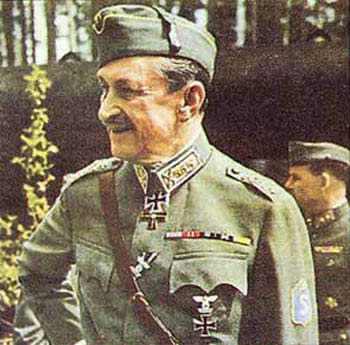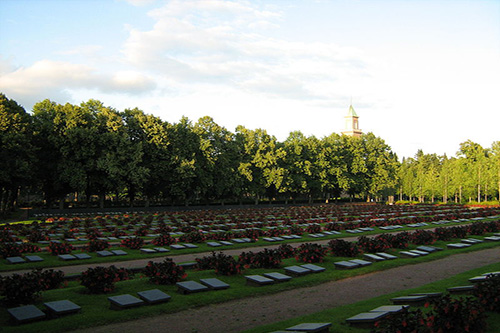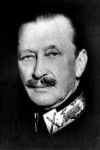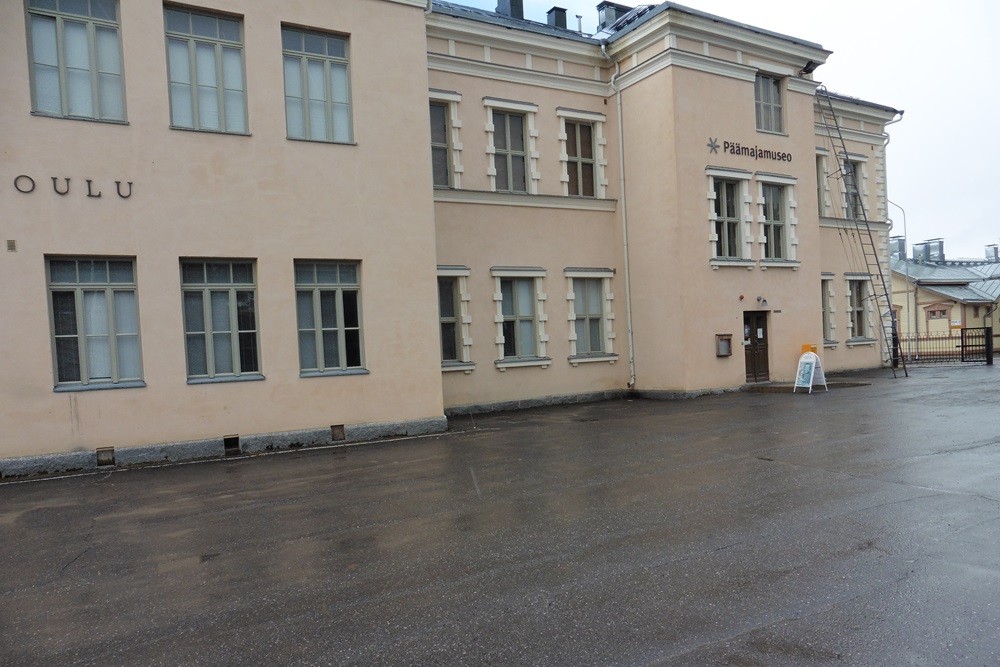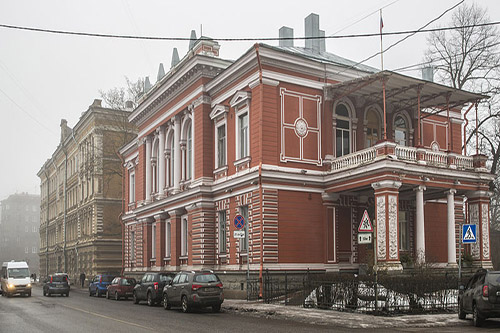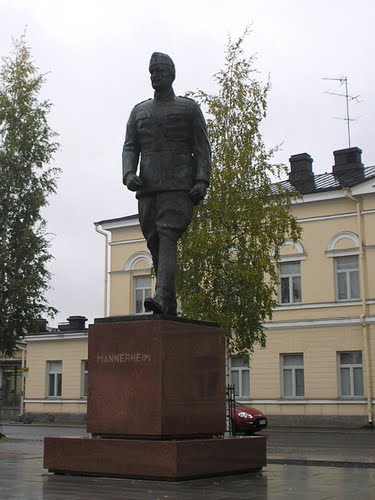.
Carl Gustaf Emil Mannerheim was born June 4th, 1867 in Louhisaari, the third child of Count Carl Robert Mannerheim and his wife Helena von Julin. At the age of 14 he enrolled in a course for officers in Hamina but was expelled from school for disciplinary reasons. After having passed an entrance exam, he was admitted to the military school of the Russian army in St. Petersburg where he took a course in cavalry. After graduation, Mannerheim served in the Alexandrijski-Dragoons, stationed in Poland. After having served a few years there he returned to a guards unit in St. Petersburg. In 1892, he married Anastasia Arapova, daughter of the Russian Major-general Nicolas Arapov. They had two daughters, Anastasia and Sophia.. Their marriage was dissolved however in 1903 but the divorce was not officially confirmed until 1917.
Mannerheim took part in the Russo-Japanese war of 1904 and 1905. At the time he held the function of staff officer in the Nezhinski Dragoon regiment and he was soon promoted to the rank of colonel. After the war, Mannerheim remained in the army of the Czar. There was huge unrest in the Russian Empire among the laborers and farmers who were set against the Czarist regime by Marxist groups. The Russian army had the situation well in hand though and it would take more than 10 years before the Czar would lose authority in Russia. In 1911, Mannerheim was promoted to the rank of General-major and he was placed in command of a Guards regiment in Poland.
During World War One, Mannerheim was in command of a brigade and later on he commanded the 12th Cavalry Division during the battle of the Russian army against Austria. In 1914, Mannerheim was awarded the Order of Saint George, the highest Russian military decoration. In recognition of his excellent services, Mannerheim rose to the rank of Lieutenant-general and was placed in command of the 6th Cavalry Corps.
The Russian Revolution marked the end of Mannerheim’s career in the Russian army and in 1917 he returned to his home country Finland. After the collapse of the Russian empire, Finland had declared her independence but great unrest prevailed in the fledgling state as there were many Communists who wanted Finland to join the Soviet Union and moreover, there were still 40,000 Russian troops stationed in Finland. Mannerheim took command of the new Finnish armed forces that fought on the side of the Whites in a bloody civil war against the Communist Red Army. The civil war lasted three months and in May 1918, Mannerheim’s White Army managed to accomplish a decisive victory.
Following the civil war, tension rose between Mannerheim and the Finnish government because he did not agree with its pro-German policy. Mannerheim foresaw problems for Finland - after all her independence was not yet generally acknowledged - if the government continued supporting the Germans who were losing the war. Mannerheim submitted his resignation and went abroad where he managed to influence the policy of the victors of the war, France and Great Britain, to the advantage of Finland, despite his unofficial position. The situation took a different turn when Germany finally collapsed. Mannerheim returned to Finland in December 1918 and became temporary head of state. During the 1919 elections he lost to his rival Ståhlberg ending his position as head of state. Nevertheless, Mannerheim signed the Constitution of the Finnish Republic in July 1919 and he returned to the Finnish army.
In the early 20s, Mannerheim was a strong advocate of counter revolutionary activities against the new Soviet state but after the counter revolution had failed, he resigned again. During the next few years, Mannerheim worked for the Finnish Red Cross. In 1931 however, he was recalled by the government to take the post of chairman of the Defense Council. He developed a defensive strategy against eventual attacks by the Soviet Union but he got hardly any response when he asked for additional financial means. Nonetheless, defensive measures were taken in Finland in the 30s to put up resistance against a possible invasion by the Red Army. In 1933, Mannerheim was given the honorable title of field marshal.
On November 30th, 1939, the Red Army invaded Finland and Mannerheim was appointed supreme commander of the Finnish armed forces immediately. During the Winter war, Mannerheim succeeded again in proving his capabilities as a military strategist and inflicted severe losses on the Red Army by brilliantly executed improvisations. It was therefore also Mannerheim who urged for an armistice with the Soviet Union as Finland could not possibly win this war against the overwhelming Soviet majority. As a result, a peace treaty with Moscow was signed in March 1940 but Finland was forced to cede a sizable portion of her territory to the Soviets.
Finland remained convinced however, the Soviet Union would attack once more in the future. In the meantime, the Germans had begun preparing for Operation Barbarossa and Finland was asked to be an ally in the war against the Soviet Union. This way, the Finns were offered a unique opportunity to recapture the lost territory and so billeting German troops in Finland was approved. Mannerheim did press however for a restriction of the treaty with Germany, in the end resulting in the Waffenbruderschaft (brotherhood in arms). Contrary to Romania and Italy for instance, Finland was not a full fledged ally of Germany and retained the right to act on her own initiative.
On June 22nd, 1941, the Germans launched Operation Barbarossa and a few days later, the Finns also attacked the Red Army. The so-called sequel war had begun. Mannerheim and his troops managed to capture the Karelian isthmus with great difficulty and in September 1941, he decided to halt his troops. To the great anger of the Germans, Mannerheim refused to deploy his troops in the storming of Leningrad. This was a very bright move as he probably realized as early as September the Germans would never succeed in defeating the Soviet-Union. The Finns dug in along the ancient border and for two years, all remained quiet on the Finnish front.
Mannerheim was very reticent about becoming too closely involved in German foreign policy. Although the Allies had declared war on Finland, hostile actions did not occur. After the Soviets had inflicted some serious defeats on the Germans, Stalin (Bio Stalin) once again turned his attention to Finland and in July 1944, the Red Army attacked across the Karelian isthmus. The Finns stood no chance whatsoever and suffered defeat after defeat. In August 1944 Mannerheim – meanwhile promoted to Marshal of Finland – was elected president. After some heavy fighting, he severed relations with Germany and signed an armistice with the Soviet Union on September 19th, 1944. From that year onwards, Finland conducted a new policy towards the Soviet Union.
Finland had escaped occupation by Soviet forces and she retained her sovereignty. Mannerheim’s personal intervention in military as well as political affairs was mainly to thank for this. Mannerheim retired in 1946.
In the final years of his life, Mannerheim spent the winters in Switzerland, where he possessed a luxurious residence but in the summer he always returned to Finland. He wrote his memoires and passed away on January 28th, 1951, in Lausanne, Switzerland.
Definitielijst
- brigade
- Consisted mostly of two or more regiments. Could operate independently or as part of a division. Sometimes they were part of a corps instead of a division. In theory a brigade consisted of 5,000 to 7,000 men.
- cavalry
- Originally the designation for mounted troops. During World War 2 the term was used for armoured units. Main tasks are reconnaissance, attack and support of infantry.
- invasion
- Armed incursion.
- marshal
- Highest military rank, Army commander.
- Red Army
- Army of the Soviet Union.
- regiment
- Part of a division. A division divided into a number of regiments. In the army traditionally the name of the major organised unit of one type of weapon.
- resistance
- Resistance against the enemy. Often also with armed resources.
- Revolution
- Usually sudden and violent reversal of existing (political) the political set-up and situations.
- Soviet Union
- Soviet Russia, alternative name for the USSR.
- strategy
- Art of warfare, the way in which war should be conducted in general.
Images
Information
- Article by:
- Tom Notten
- Translated by:
- Arnold Palthe
- Published on:
- 19-01-2025
- Feedback?
- Send it!
- 04-'40: Death Taught the Red Army How to Win
- 06-'42: Our Diary of the War
The War Illustrated
Related sights
Sources
-Mannerheim, Carl Gustaf Emil 1867 - 1951
